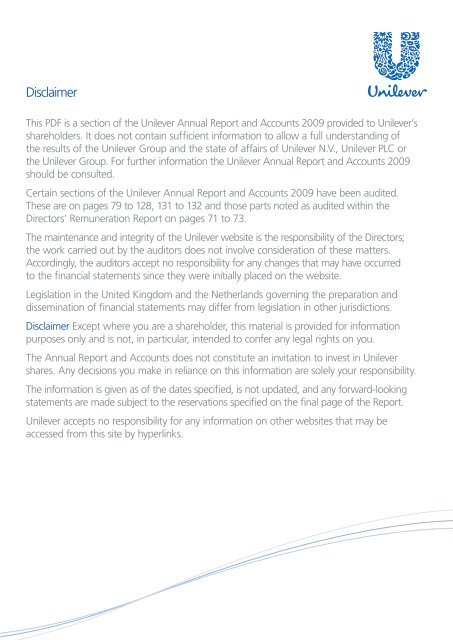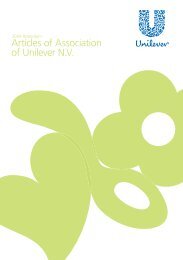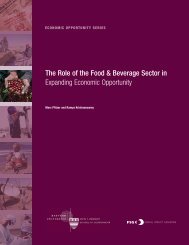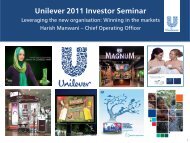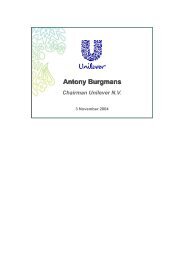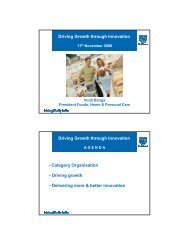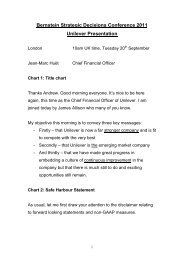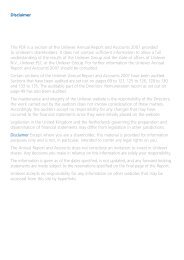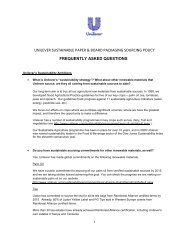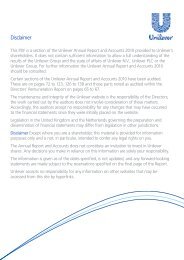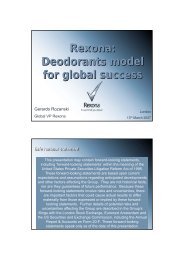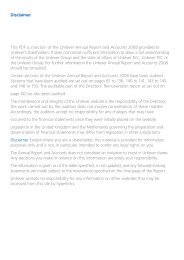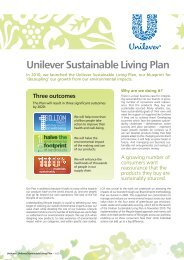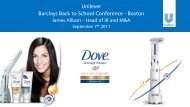Company Accounts - Unilever
Company Accounts - Unilever
Company Accounts - Unilever
You also want an ePaper? Increase the reach of your titles
YUMPU automatically turns print PDFs into web optimized ePapers that Google loves.
Disclaimer<br />
This PDF is a section of the <strong>Unilever</strong> Annual Report and <strong>Accounts</strong> 2009 provided to <strong>Unilever</strong>’s<br />
shareholders. It does not contain sufficient information to allow a full understanding of<br />
the results of the <strong>Unilever</strong> Group and the state of affairs of <strong>Unilever</strong> N.V., <strong>Unilever</strong> PLC or<br />
the <strong>Unilever</strong> Group. For further information the <strong>Unilever</strong> Annual Report and <strong>Accounts</strong> 2009<br />
should be consulted.<br />
Certain sections of the <strong>Unilever</strong> Annual Report and <strong>Accounts</strong> 2009 have been audited.<br />
These are on pages 79 to 128, 131 to 132 and those parts noted as audited within the<br />
Directors’ Remuneration Report on pages 71 to 73.<br />
The maintenance and integrity of the <strong>Unilever</strong> website is the responsibility of the Directors;<br />
the work carried out by the auditors does not involve consideration of these matters.<br />
Accordingly, the auditors accept no responsibility for any changes that may have occurred<br />
to the financial statements since they were initially placed on the website.<br />
Legislation in the United Kingdom and the Netherlands governing the preparation and<br />
dissemination of financial statements may differ from legislation in other jurisdictions.<br />
Disclaimer Except where you are a shareholder, this material is provided for information<br />
purposes only and is not, in particular, intended to confer any legal rights on you.<br />
The Annual Report and <strong>Accounts</strong> does not constitute an invitation to invest in <strong>Unilever</strong><br />
shares. Any decisions you make in reliance on this information are solely your responsibility.<br />
The information is given as of the dates specified, is not updated, and any forward-looking<br />
statements are made subject to the reservations specified on the final page of the Report.<br />
<strong>Unilever</strong> accepts no responsibility for any information on other websites that may be<br />
accessed from this site by hyperlinks.
<strong>Company</strong> accounts Auditor’s report – <strong>Unilever</strong> N.V.<br />
Independent auditor’s report to the shareholders of <strong>Unilever</strong><br />
N.V.<br />
Report on the company accounts<br />
We have audited the company accounts which are part of the<br />
Annual Report 2009 of <strong>Unilever</strong> N.V., Rotterdam, for the year<br />
ended 31 December 2009 which comprise the balance sheet, profit<br />
and loss account and the related notes on pages 134 to 136.<br />
We have reported separately on the consolidated accounts of the<br />
<strong>Unilever</strong> Group for the year ended 31 December 2009.<br />
Directors’ responsibility<br />
The Directors are responsible for the preparation and fair<br />
presentation of the company accounts in accordance with United<br />
Kingdom accounting standards and with Part 9 of Book 2 of the<br />
Netherlands Civil Code, and for the preparation of the Report<br />
of the Directors in accordance with Part 9 of Book 2 of the<br />
Netherlands Civil Code. This responsibility includes: designing,<br />
implementing and maintaining internal control relevant to the<br />
preparation and fair presentation of the company accounts that<br />
are free from material misstatement, whether due to fraud or<br />
error; selecting and applying appropriate accounting policies;<br />
and making accounting estimates that are reasonable in<br />
the circumstances.<br />
Auditor’s responsibility<br />
Our responsibility is to express an opinion on the company<br />
accounts based on our audit. We conducted our audit in<br />
accordance with Dutch law. This law requires that we comply<br />
with ethical requirements and plan and perform the audit to<br />
obtain reasonable assurance whether the company accounts<br />
are free from material misstatement.<br />
An audit involves performing procedures to obtain audit evidence<br />
about the amounts and disclosures in the company accounts.<br />
The procedures selected depend on the auditor’s judgement,<br />
including the assessment of the risks of material misstatement of<br />
the company accounts, whether due to fraud or error. In making<br />
those risk assessments, the auditor considers internal control<br />
relevant to the entity’s preparation and fair presentation of the<br />
company accounts in order to design audit procedures that are<br />
appropriate in the circumstances, but not for the purpose of<br />
expressing an opinion on the effectiveness of the entity’s internal<br />
control. An audit also includes evaluating the appropriateness of<br />
accounting policies used and the reasonableness of accounting<br />
estimates made by the Directors, as well as evaluating the overall<br />
presentation of the company accounts.<br />
We believe that the audit evidence we have obtained is sufficient<br />
and appropriate to provide a basis for our audit opinion.<br />
Opinion<br />
In our opinion, the company accounts give a true and fair view<br />
of the financial position of <strong>Unilever</strong> N.V. as at 31 December 2009,<br />
and of its result for the year then ended in accordance with United<br />
Kingdom accounting standards and with Part 9 of Book 2 of the<br />
Netherlands Civil Code.<br />
Report on other legal and regulatory requirements<br />
Pursuant to the legal requirement under 2:393 sub 5 part f<br />
of the Netherlands Civil Code, we report, to the extent of<br />
our competence, that the Report of the Directors is consistent with<br />
the company accounts as required by 2:391 sub 4 of<br />
the Netherlands Civil Code.<br />
Rotterdam, The Netherlands, 2 March 2010<br />
PricewaterhouseCoopers Accountants N.V.<br />
R A J Swaak RA<br />
<strong>Unilever</strong> Annual Report and <strong>Accounts</strong> 2009 133
Financial statements<br />
<strong>Company</strong> accounts <strong>Unilever</strong> N.V.<br />
Balance sheet as at 31 December<br />
(after proposed appropriation of profit)<br />
134 <strong>Unilever</strong> Annual Report and <strong>Accounts</strong> 2009<br />
€ million € million<br />
2009 2008<br />
Fixed assets<br />
Fixed investments 26,289 26,245<br />
Debtors due after more than one year 3,242 2,918<br />
Deferred taxation 18 –<br />
Total non-current assets 3,260 2,918<br />
Debtors due within one year 1,740 2,656<br />
Deferred taxation 20 –<br />
Cash at bank and in hand 14 7<br />
Total current assets 1,774 2,663<br />
Creditors due within one year (17,163) (18,122)<br />
Net current assets/(liabilities) (15,389) (15,459)<br />
Total assets less current liabilities 14,160 13,704<br />
Creditors due after more than one year 6,515 6,207<br />
Provisions for liabilities and charges (excluding pensions and similar obligations) 15 59<br />
Net pension liability 90 84<br />
Capital and reserves 7,540 7,354<br />
Called up share capital 275 275<br />
Share premium account 20 20<br />
Legal reserves 16 16<br />
Other reserves (3,428) (3,559)<br />
Profit retained 10,657 10,602<br />
Total capital employed 14,160 13,704<br />
Profit and loss account for the year ended 31 December<br />
€ million € million<br />
2009 2008<br />
Income from fixed investments after taxation 1,306 1,422<br />
Other income and expenses (19) 291<br />
Profit for the year 1,287 1,713<br />
For the information required by Article 392 of Book 2 of the Civil Code in the Netherlands, refer to pages 133 and 137. Pages 135 and 136 are<br />
part of the notes to the <strong>Unilever</strong> N.V. company accounts.<br />
The company accounts of <strong>Unilever</strong> N.V. are included in the consolidated accounts of the <strong>Unilever</strong> Group. Therefore, and in accordance with<br />
Article 402 of Book 2 of the Civil Code in the Netherlands, the profit and loss account only reflects the income from fixed investments after<br />
taxation and other income and expenses after taxes. The company accounts of <strong>Unilever</strong> N.V. do not contain a cash flow statement as this is<br />
not required by Book 2 of the Civil Code in the Netherlands.<br />
The Board of Directors<br />
2 March 2010
Notes to the company accounts <strong>Unilever</strong> N.V.<br />
Accounting information and policies<br />
Basis of preparation<br />
The company accounts of <strong>Unilever</strong> N.V. comply in all material respects<br />
with legislation in the Netherlands. As allowed by Article 362.1 of<br />
Book 2 of the Civil Code in the Netherlands, the company accounts<br />
are prepared in accordance with United Kingdom accounting<br />
standards, unless such standards conflict with the Civil Code in<br />
the Netherlands which would in such case prevail.<br />
The accounts are prepared under the historical cost convention as<br />
modified by the revaluation of financial assets classified as ‘availablefor-sale<br />
investments’, ‘financial assets at fair value through profit<br />
or loss’, and ‘derivative financial instruments’ in accordance with<br />
the accounting policies set out below which have been<br />
consistently applied.<br />
Accounting policies<br />
The principal accounting policies are as follows:<br />
Fixed investments<br />
Shares in group companies are stated at cost less any amounts written<br />
off to reflect a permanent impairment. Any impairment is charged<br />
to the profit and loss account as it arises. In accordance with Article<br />
385.5 of Book 2 of the Civil Code in the Netherlands, <strong>Unilever</strong> N.V.<br />
shares held by <strong>Unilever</strong> N.V. subsidiaries are deducted from the<br />
carrying value of those subsidiaries. This differs from the accounting<br />
treatment under UK GAAP, which would require these amounts to<br />
be included within fixed investments.<br />
Financial instruments and derivative financial instruments<br />
The company’s accounting policies under United Kingdom generally<br />
accepted accounting principles (UK GAAP) namely FRS 25 ‘Financial<br />
Instruments: Presentation’, FRS 26 ‘Financial Instruments:<br />
Measurement’ and FRS 29 ‘Financial Instruments: Disclosures’ are the<br />
same as the <strong>Unilever</strong> Group’s accounting policies under International<br />
Financial Reporting Standards (IFRS) namely IAS 32 ‘Financial<br />
Instruments: Presentation’, IAS 39 ‘Financial Instruments: Recognition<br />
and Measurement’ and IFRS 7 ‘Financial Instruments: Disclosures’. The<br />
policies are set out under the heading ‘Financial instruments’ in note 1<br />
to the consolidated accounts on pages 84 and 85. NV is taking the<br />
exemption for not providing all the financial instruments disclosures,<br />
because IFRS 7 disclosures are given in note 15 to the consolidated<br />
accounts on pages 104 to 110.<br />
Deferred taxation<br />
Full provision is made for deferred taxation on all significant timing<br />
differences arising from the recognition of items for taxation purposes<br />
in different periods from those in which they are included in the<br />
company's accounts. Full provision is made at the rates of tax<br />
prevailing at the year end unless future rates have been enacted<br />
or substantively enacted. Deferred tax assets and liabilities have<br />
not been discounted.<br />
Own shares held<br />
Own shares held by the company are accounted for in accordance<br />
with Dutch law and UK GAAP, namely FRS 25 ‘Financial Instruments:<br />
Presentation’. All differences between the purchase price of the shares<br />
held to satisfy options granted and the proceeds received for the<br />
shares, whether on exercise or lapse, are charged to reserves.<br />
Retirement benefits<br />
<strong>Unilever</strong> N.V. has accounted for pensions and similar benefits under<br />
the United Kingdom Financial Reporting Standard 17 'Retirement<br />
benefits' (FRS 17). The operating and financing costs of defined<br />
benefit plans are recognised separately in the profit and loss account;<br />
service costs are systematically spread over the service lives of<br />
employees, and financing costs are recognised in the periods in which<br />
they arise. Variations from expected costs, arising from the experience<br />
of the plans or changes in actuarial assumptions, are recognised<br />
immediately in the statement of comprehensive income. The costs of<br />
individual events such as past service benefit enhancements,<br />
settlements and curtailments are recognised immediately in the profit<br />
and loss account. The liabilities and, where applicable, the assets of<br />
defined benefit plans are recognised at fair value in the balance sheet.<br />
The charges to the profit and loss account for defined contribution<br />
plans are the company contributions payable and the assets of such<br />
plans are not included in the company balance sheet.<br />
Dividends<br />
Under Financial Reporting Standard 21 ‘Events after the Balance Sheet<br />
Date’ (FRS 21), proposed dividends do not meet the definition of a<br />
liability until such time as they have been approved by shareholders at<br />
the Annual General Meeting. Therefore, we do not recognise a liability<br />
in any period for dividends that have been proposed but will not be<br />
approved until after the balance sheet date. This holds for external<br />
dividends as well as intra-group dividends paid to the parent company.<br />
Taxation<br />
<strong>Unilever</strong> N.V, together with certain of its subsidiaries, is part of a tax<br />
grouping for Dutch corporate income tax purposes. The members of<br />
the fiscal entity are jointly and severally liable for any taxes payable by<br />
the Dutch tax grouping.<br />
Fixed investments € million € million<br />
2009 2008<br />
Shares in group companies 26,095 25,989<br />
PLC shares held in connection with<br />
share options 194 256<br />
26,289 26,245<br />
Movements during the year:<br />
1 January 26,245 24,423<br />
PLC shares held in connection<br />
with share options (62) 72<br />
NV shares held by group companies – 189<br />
Additions (a) 3,840 5,620<br />
Decreases (a) (3,734) (4,059)<br />
31 December 26,289 26,245<br />
(a) The additions relate to two investments in group companies. The<br />
decreases relate to repayments made by the subsidiary <strong>Unilever</strong><br />
Finance International B.V. and to the divestment of three group<br />
companies.<br />
Debtors € million € million<br />
2009 2008<br />
Loans to group companies 3,242 3,688<br />
Other amounts owed by group companies 1,668 1,801<br />
Taxation 28 24<br />
Other 44 61<br />
4,982 5,574<br />
Of which due after more than one year 3,242 2,918<br />
<strong>Unilever</strong> Annual Report and <strong>Accounts</strong> 2009 135
Financial statements<br />
Cash at bank and in hand<br />
There was no cash at bank and in hand for which payment notice was<br />
required at either 31 December 2009 or 31 December 2008.<br />
Creditors € million € million<br />
Due within one year:<br />
2009 2008<br />
Other amounts owed to group companies 15,967 16,030<br />
Loans from group companies 972 1,150<br />
Bonds and other loans 33 772<br />
Taxation and social security 15 15<br />
Accruals and deferred income 67 88<br />
Other 109 67<br />
136 <strong>Unilever</strong> Annual Report and <strong>Accounts</strong> 2009<br />
17,163 18,122<br />
Due after more than one year:<br />
Bonds and other loans 3,297 2,961<br />
Loans from group companies 3,089 3,089<br />
Accruals and deferred income 5 33<br />
Preference shares 124 124<br />
6,515 6,207<br />
Creditors due after five years amount to €1,107 million (2008: €1,103<br />
million) (Article 375.2 of Book 2 of the Civil Code in the Netherlands).<br />
Ordinary share capital<br />
Shares numbered 1 to 2,400 are held by a subsidiary of NV and<br />
a subsidiary of PLC, each holding 50%. Additionally, 170,178,644<br />
(2008: 177,223,649) €0.16 ordinary shares are held by NV and<br />
other group companies. Further details are given in note 22 to the<br />
consolidated accounts on page 119.<br />
Share premium account<br />
The share premium shown in the balance sheet is not available for the<br />
issue of bonus shares or for repayment without incurring withholding<br />
tax payable by the company. This is despite the change in tax law in<br />
the Netherlands, as a result of which dividends received from 2001<br />
onwards by individual shareholders who are resident in the<br />
Netherlands are no longer taxed.<br />
Other reserves € million € million<br />
2009 2008<br />
1 January (3,559) (2,437)<br />
Change during the year 131 (1,122)<br />
31 December (3,428) (3,559)<br />
Other reserves relate to own shares held.<br />
Profit retained € million € million<br />
2009 2008<br />
1 January 10,602 10,009<br />
Profit for the year 1,287 1,713<br />
Ordinary dividends – final 2007 – (779)<br />
Ordinary dividends – interim 2008 – (401)<br />
Ordinary dividends – final 2008 (786) –<br />
Ordinary dividends – interim 2009 (417) –<br />
Taxation charge 2 (11)<br />
Realised profit/(loss) on shares/certificates held<br />
to meet employee share options (8) 14<br />
Changes in present value of net pension liability (9) 53<br />
Other charges (14) 4<br />
31 December 10,657 10,602<br />
As shown in note 24 on page 120, the total profit retained of NV<br />
amounts to €16,458 million (2008: €15,343 million). This is made up<br />
of the Parent <strong>Unilever</strong> N.V. €10,657 million (2008: €10,602 million),<br />
other NV group companies €5,730 million (2008: €4,732 million) and<br />
joint ventures and associates €71 million (2008: €9 million).<br />
Provisions for liabilities and charges (excluding pensions and<br />
similar obligations)<br />
€ million € million<br />
2009 2008<br />
Deferred taxation – 18<br />
Other provisions 15 41<br />
15 59<br />
Of which due within one year 14 59<br />
Net pension liability<br />
€ million € million<br />
2009 2008<br />
Funded retirement benefit (9) (12)<br />
Unfunded retirement liability 99 96<br />
90 84<br />
Contingent liabilities<br />
Contingent liabilities are not expected to give rise to any material<br />
loss and include guarantees given for group companies. The estimated<br />
total of such liabilities as at 31 December 2009 was some<br />
€5,193 million (2008: €6,050 million) of which €3,655 million<br />
(2008: €4,420 million) was also guaranteed by PLC. The fair value<br />
of such guarantees was not significant in either 2008 or 2009.<br />
The guarantees issued to other companies were immaterial.<br />
NV has issued joint and several liability undertakings, as defined in<br />
Article 403 of Book 2 of the Civil Code in the Netherlands, for almost<br />
all Dutch group companies. These written undertakings have been<br />
filed with the office of the <strong>Company</strong> Registry in whose area of<br />
jurisdiction the group company concerned has its registered office.<br />
Directors’ remuneration<br />
Information about the remuneration of Directors is given in the tables<br />
noted as audited in the Directors’ Remuneration Report on pages 67<br />
to 73, incorporated and repeated here by reference.
Further statutory and other information <strong>Unilever</strong> N.V.<br />
The rules for profit appropriation in the Articles of Association<br />
(summary of Article 38)<br />
The profit for the year is applied firstly to the reserves required by law<br />
or by the Equalisation Agreement, secondly to cover losses of previous<br />
years, if any, and thirdly to the reserves deemed necessary by the Board<br />
of Directors. Dividends due to the holders of the Cumulative<br />
Preference Shares, including any arrears in such dividends, are then<br />
paid; if the profit is insufficient for this purpose, the amount available<br />
is distributed to them in proportion to the dividend percentages of<br />
their shares. Any profit remaining thereafter shall be distributed to the<br />
holders of ordinary shares in proportion to the nominal value of their<br />
respective holdings of ordinary shares. The General Meeting can only<br />
decide to make distributions from reserves on the basis of a proposal<br />
by the Board and in compliance with the law and the Equalisation<br />
Agreement.<br />
Proposed profit appropriation € million € million<br />
2009 2008<br />
Profit for the year (available for distribution) 1,287 1,713<br />
Interim dividend already paid (417) (401)<br />
To profit retained 870 1,312<br />
Corporate Centre<br />
<strong>Unilever</strong> N.V.<br />
Weena 455<br />
PO Box 760<br />
3000 DK Rotterdam<br />
The Netherlands<br />
Post balance sheet event<br />
On 4 February 2010 the Directors announced a dividend of<br />
€0.1950 per <strong>Unilever</strong> N.V. ordinary share. The dividend is payable<br />
from 17 March 2010 to shareholders registered at close of business<br />
on 12 February 2010.<br />
Special controlling rights under the Articles of Association<br />
See note 22 to the consolidated accounts on page 119.<br />
Auditors<br />
A resolution will be proposed at the Annual General Meeting on<br />
11 May 2010 for the re-appointment of PricewaterhouseCoopers<br />
Accountants N.V. as auditors of <strong>Unilever</strong> N.V. The present<br />
appointment will end at the conclusion of the Annual General<br />
Meeting. For details of the remuneration of the auditors please<br />
refer to note 31 on page 128.<br />
<strong>Unilever</strong> Annual Report and <strong>Accounts</strong> 2009 137
Financial statements<br />
<strong>Company</strong> accounts Auditors’ report – <strong>Unilever</strong> PLC<br />
Independent auditors’ report to the members of <strong>Unilever</strong><br />
PLC on the parent company accounts<br />
We have audited the parent company accounts of <strong>Unilever</strong> PLC for<br />
the year ended 31 December 2009 which comprise the balance<br />
sheet and the related notes. The financial reporting framework<br />
that has been applied in their preparation is applicable law and<br />
United Kingdom Accounting Standards (United Kingdom Generally<br />
Accepted Accounting Practice).<br />
Respective responsibilities of Directors and auditors<br />
As explained more fully in the Statement of Directors’<br />
Responsibilities on page 76, the Directors are responsible for the<br />
preparation of the parent company accounts and for being<br />
satisfied that they give a true and fair view. Our responsibility is to<br />
audit the parent company accounts in accordance with applicable<br />
law and International Standards on Auditing (UK and Ireland).<br />
Those standards require us to comply with the Auditing Practices<br />
Board’s Ethical Standards for Auditors.<br />
This report, including the opinions, has been prepared for and only<br />
for the shareholders of <strong>Unilever</strong> PLC as a body in accordance with<br />
Chapter 3 of Part 16 of the Companies Act 2006 and for no other<br />
purpose. We do not, in giving these opinions, accept or assume<br />
responsibility for any other purpose or to any other person to<br />
whom this report is shown or into whose hands it may come save<br />
where expressly agreed by our prior consent in writing.<br />
Scope of the audit of the accounts<br />
An audit involves obtaining evidence about the amounts and<br />
disclosures in the accounts sufficient to give reasonable assurance<br />
that the accounts are free from material misstatement, whether<br />
caused by fraud or error. This includes an assessment of: whether<br />
the accounting policies are appropriate to the parent company’s<br />
circumstances and have been consistently applied and adequately<br />
disclosed; the reasonableness of significant accounting estimates<br />
made by the directors; and the overall presentation of the<br />
accounts.<br />
Opinion on accounts<br />
In our opinion the parent company accounts:<br />
• give a true and fair view of the state of the company’s affairs as<br />
at 31 December 2009;<br />
• have been properly prepared in accordance with United<br />
Kingdom Generally Accepted Accounting Practice; and<br />
• have been prepared in accordance with the Companies Act<br />
2006.<br />
138 <strong>Unilever</strong> Annual Report and <strong>Accounts</strong> 2009<br />
Opinion on other matters prescribed by the Companies Act<br />
2006<br />
In our opinion:<br />
• the part of the Directors’ Remuneration Report to be audited<br />
has been properly prepared in accordance with the Companies<br />
Act 2006; and<br />
• the information given in the Report of the Directors for the<br />
financial year for which the parent company accounts are<br />
prepared is consistent with the parent company accounts.<br />
Matters on which we are required to report by exception<br />
We have nothing to report in respect of the following matters<br />
where the Companies Act 2006 requires us to report to you if, in<br />
our opinion:<br />
• adequate accounting records have not been kept by the parent<br />
company, or returns adequate for our audit have not been<br />
received from branches not visited by us; or<br />
• the parent company accounts and the part of the Directors’<br />
Remuneration Report to be audited are not in agreement with<br />
the accounting records and returns; or<br />
• certain disclosures of directors’ remuneration specified by law<br />
are not made; or<br />
• we have not received all the information and explanations we<br />
require for our audit.<br />
Other matter<br />
We have reported separately on the consolidated financial<br />
statements of <strong>Unilever</strong> Group for the year ended 31 December<br />
2009.<br />
Richard Sexton<br />
(Senior Statutory Auditor)<br />
For and on behalf of PricewaterhouseCoopers LLP<br />
Chartered Accountants and Statutory Auditors<br />
London, United Kingdom<br />
2 March 2010
<strong>Company</strong> accounts <strong>Unilever</strong> PLC<br />
Balance sheet as at 31 December<br />
£ million £ million<br />
2009 2008<br />
Fixed assets<br />
Intangible assets 7 9<br />
Fixed asset investments 5,929 4,393<br />
Current assets<br />
Debtors due within one year 375 595<br />
Total current assets 375 595<br />
Creditors due within one year (3,761) (3,379)<br />
Net current assets/(liabilities) (3,386) (2,784)<br />
Total assets less current liabilities 2,550 1,618<br />
Creditors due after more than one year 743 –<br />
Provision for liabilities and charges (excluding pensions and similar obligations) 10 10<br />
Capital and reserves 1,797 1,608<br />
Called up share capital 41 41<br />
Share premium account 94 94<br />
Capital redemption reserve 11 11<br />
Other reserves (455) (489)<br />
Profit retained 2,106 1,951<br />
Total capital employed 2,550 1,618<br />
As permitted by Section 408 of the United Kingdom Companies Act 2006, an entity profit and loss account is not included as part of the<br />
published company accounts for PLC. Under the terms of Financial Reporting Standard 1 (revised 1996) ‘Cash Flow Statements’ (FRS 1) a cash<br />
flow statement is not included, as the cash flows are included in the consolidated cash flow statement of the <strong>Unilever</strong> Group.<br />
On behalf of the Board of Directors<br />
M Treschow Chairman<br />
P Polman Chief Executive Officer<br />
2 March 2010<br />
<strong>Unilever</strong> Annual Report and <strong>Accounts</strong> 2009 139
Financial statements<br />
Notes to the company accounts <strong>Unilever</strong> PLC<br />
Accounting information and policies<br />
Basis of preparation<br />
The accounts have been prepared in accordance with applicable<br />
United Kingdom accounting standards and the United Kingdom<br />
Companies Act 2006.<br />
The accounts are prepared under the historical cost convention as<br />
modified by the revaluation of financial assets classified as ‘available-forsale<br />
investments’, ‘financial assets at fair value through profit or loss’,<br />
and ‘derivative financial instruments’ in accordance with the accounting<br />
policies set out below which have been consistently applied.<br />
Accounting policies<br />
The principal accounting policies are as follows:<br />
Intangible assets<br />
Intangible assets comprise trademarks purchased after 1 January 1998<br />
and are amortised in the profit and loss account over their expected<br />
useful lives of up to a maximum of 20 years. They are subject to review<br />
for impairment in accordance with United Kingdom Financial<br />
Reporting Standard 11 ‘Impairment of Fixed Assets and Goodwill’<br />
(FRS 11). Any impairment is charged to the profit and loss account<br />
as it arises.<br />
Fixed asset investments<br />
Shares in group companies are stated at cost less any amounts written<br />
off to reflect a permanent impairment. Any impairment is charged to<br />
the profit and loss account as it arises.<br />
Financial instruments<br />
The company’s accounting policies under United Kingdom generally<br />
accepted accounting principles (UK GAAP) namely FRS 25 ‘Financial<br />
Instruments: Presentation’, FRS 26 ‘Financial Instruments:<br />
Measurement’ and FRS 29 ‘Financial Instruments: Disclosures’ are the<br />
same as the <strong>Unilever</strong> Group’s accounting policies under International<br />
Financial Reporting Standards (IFRS) namely IAS 32 ‘Financial<br />
Instruments: Presentation’, IAS 39 ‘Financial Instruments: Recognition<br />
and Measurement’ and IFRS 7 ‘Financial Instruments: Disclosures’. The<br />
policies are set out under the heading ‘Financial instruments’ in note 1<br />
to the consolidated accounts on pages 84 and 85. PLC is taking the<br />
exemption for not providing all the financial instruments disclosures,<br />
because IFRS 7 disclosures are given in note 15 to the consolidated<br />
accounts on pages 104 to 110.<br />
140 <strong>Unilever</strong> Annual Report and <strong>Accounts</strong> 2009<br />
Deferred taxation<br />
Full provision is made for deferred taxation on all significant timing<br />
differences arising from the recognition of items for taxation purposes<br />
in different periods from those in which they are included in the<br />
company’s accounts. Full provision is made at the rates of tax<br />
prevailing at the year end unless future rates have been enacted<br />
or substantively enacted. Deferred tax assets and liabilities have not<br />
been discounted.<br />
Shares held by employee share trusts<br />
Shares held to satisfy options are accounted for in accordance with UK<br />
GAAP, namely FRS 25 ‘Financial Instruments: Presentation’, FRS 20<br />
‘Share Based Payments’ and Urgent Issues Task Force abstract 38<br />
‘Accounting for ESOP Trusts’ (UITF 38). All differences between the<br />
purchase price of the shares held to satisfy options granted and the<br />
proceeds received for the shares, whether on exercise or lapse, are<br />
charged to other reserves.<br />
Dividends<br />
Under Financial Reporting Standard 21 ‘Events after the Balance Sheet<br />
Date’ (FRS 21), proposed dividends do not meet the definition of a<br />
liability until such time as they have been approved by shareholders<br />
at the Annual General Meeting. Therefore, we do not recognise a<br />
liability in any period for dividends that have been proposed but will<br />
not be approved until after the balance sheet date. This holds for<br />
external dividends as well as intra-group dividends paid to the parent<br />
company.
Notes to the company accounts <strong>Unilever</strong> PLC<br />
Fixed asset investments £ million £ million<br />
2009 2008<br />
Shares in group companies (a) 5,929 4,393<br />
(a) The movement in the year is an additional investment in a<br />
group company.<br />
Debtors £ million £ million<br />
2009 2008<br />
Due within one year:<br />
Amounts owed by group companies 374 593<br />
Other 1 2<br />
375 595<br />
Creditors £ million £ million<br />
2009 2008<br />
Due within one year:<br />
Amounts owed to group companies 3,687 3,273<br />
Taxation and social security 63 100<br />
Accruals and deferred income 11 6<br />
3,761 3,379<br />
Due after more than one year:<br />
Bonds and other loans (b) 743 –<br />
(b) During 2009 <strong>Unilever</strong> PLC issued the following senior notes:<br />
• on 19 March £350 million at 4.0% maturing December 2014<br />
(year-end value at amortised cost £346 million)<br />
• on 17 June £400 million at 4.75% maturing June 2017 (year-end<br />
value amortised cost £397 million).<br />
Provisions for liabilities and charges (excluding pensions and<br />
similar obligations)<br />
£ million £ million<br />
2009 2008<br />
Deferred taxation 10 10<br />
Ordinary share capital<br />
Information on the consolidation of ordinary shares is given in note 22<br />
to the consolidated accounts on page 119.<br />
Other reserves £ million £ million<br />
2009 2008<br />
1 January (489) (281)<br />
Change in book value of shares 34 (208)<br />
31 December (455) (489)<br />
Profit retained £ million £ million<br />
2009 2008<br />
1 January 1,951 1,721<br />
Profit for the year<br />
Final dividend 2007 on ordinary and<br />
977 931<br />
deferred shares<br />
Interim dividend 2008 on ordinary and<br />
– (439)<br />
deferred shares<br />
Final dividend 2008 on ordinary and<br />
– (262)<br />
deferred shares<br />
Interim dividend 2009 on ordinary and<br />
(513) –<br />
deferred shares (309) –<br />
31 December 2,106 1,951<br />
Contingent liabilities<br />
Contingent liabilities are not expected to give rise to any material loss<br />
and include guarantees given for group companies. The estimated total<br />
of such liabilities at 31 December 2009 was some £6,122 million<br />
(2008: £7,905 million) of which £3,245 million (2008: £4,319 million)<br />
was also guaranteed by NV. The fair value of such guarantees is not<br />
significant in either 2008 or 2009. The guarantees issued to other<br />
companies were immaterial.<br />
Remuneration of auditors<br />
The parent company accounts of <strong>Unilever</strong> PLC are required to comply<br />
with The Companies (Disclosure of Auditor Remuneration) Regulations<br />
2005. Auditors’ remuneration in respect of <strong>Unilever</strong> PLC is included<br />
within the disclosures in note 31 on page 128.<br />
Profit appropriation £ million £ million<br />
2009 2008<br />
Profit for the year (available for distribution) 977 931<br />
Interim dividend already paid (309) (262)<br />
To profit retained 668 669<br />
Post balance sheet event<br />
On 4 February 2010 the Directors announced a dividend of<br />
£0.1704 per <strong>Unilever</strong> PLC ordinary share. The dividend is payable<br />
from 17 March 2010 to shareholders registered at close of business on<br />
12 February 2010.<br />
<strong>Unilever</strong> Annual Report and <strong>Accounts</strong> 2009 141
Financial statements<br />
Further statutory and other information <strong>Unilever</strong> PLC<br />
Directors’ Report of PLC and limitations of liability<br />
For the purposes of the Companies Act 2006, the Directors’<br />
Report of <strong>Unilever</strong> PLC for the year ended 31 December 2009<br />
comprises this and the following page and the information<br />
contained in the Report of the Directors on pages 2 to 62 which<br />
includes the <strong>Company</strong>’s position on environment and corporate<br />
responsibility matters, the Directors’ Remuneration Report in<br />
respect of Directors’ interests in shares or debentures of the Group<br />
on pages 72 and 73, Dividends on page 93, Principal group<br />
companies and non-current investments on pages 131 and 132,<br />
Significant shareholders of PLC as disclosed on page 144, and<br />
Financial instruments and Treasury risk management on page 104.<br />
The information required to be given pursuant to Section 992 of<br />
the UK Companies Act 2006 is covered elsewhere in this Annual<br />
Report.<br />
The Directors’ Report has been drawn up and presented in<br />
accordance with and in reliance upon English company law and<br />
liabilities of the Directors in connection with that report shall be<br />
subject to the limitations and restrictions provided by such law.<br />
Under the Companies Act 2006, a safe harbour limits the liability<br />
of Directors in respect of statements in and omissions from the<br />
Directors’ Report. Under English Law the Directors would be liable<br />
to <strong>Unilever</strong> (but not to any third party) if the Directors’ Report<br />
contains errors as a result of recklessness or knowing misstatement<br />
or dishonest concealment of a material fact, but would not<br />
otherwise be liable.<br />
Business review<br />
The UK Companies Act 2006 requires <strong>Unilever</strong> PLC to set out in<br />
this report a fair review of the business of the Group during the<br />
financial year ended 31 December 2009 including a description<br />
of the principal risks and uncertainties facing the Group and an<br />
analysis of the position of the Group’s business at the end of the<br />
financial year, known as a ‘Business review’.<br />
The information that fulfils the current Business review<br />
requirements can be found on the following pages of this Annual<br />
Report which are incorporated into this report by reference:<br />
• a description of the principal risks and uncertainties facing the<br />
Group see pages 30 to 34;<br />
• the development and performance of the Group’s business<br />
during the year see pages 37 to 46;<br />
• the position of the Group’s business at the end of the year see<br />
pages 40 and 81;<br />
• key performance indicators see page 25 and 26;<br />
• other key indicators see pages 25 and 26;<br />
• main trends and factors likely to affect the future development,<br />
performance and position of the Group see page 30;<br />
• environmental matters and policy, including the impact of the<br />
Group’s business on the environment see pages 20 to 21;<br />
• employee matters and policy see pages 14 to 15, 28 and also<br />
below; and<br />
• a statement that the Directors do not believe that there are any<br />
contracts or other arrangements which are essential to the<br />
business of the Group is given on page 59.<br />
Employee involvement and communication<br />
<strong>Unilever</strong>’s UK companies maintain formal processes to inform,<br />
consult and involve employees and their representatives. We<br />
recognise collective bargaining on a number of sites and engage<br />
with employees via the Sourcing Unit Forum including officer<br />
142 <strong>Unilever</strong> Annual Report and <strong>Accounts</strong> 2009<br />
representation from the three recognised trade unions. Our sites<br />
use tools such as Total Productive Maintenance which rely heavily<br />
on employee involvement, contribution and commitment.<br />
A National Consultative Council covering employees and<br />
management representatives exists to provide a forum for<br />
discussing issues relating to the United Kingdom. A European<br />
Works Council, embracing employee and management<br />
representatives from countries within Europe, has been in<br />
existence for several years and provides a forum for discussing<br />
issues that extend across national boundaries.<br />
The company carries out regular and wide-ranging monitoring<br />
surveys providing valuable insight into employee views, attitudes<br />
and levels of engagement.<br />
The Directors’ Reports of the United Kingdom group companies<br />
contain more details about how they have communicated with<br />
their employees during 2009.<br />
Equal opportunities and diversity<br />
Under the umbrella of our Code of Business Principles, <strong>Unilever</strong><br />
aims to ensure that people with disabilities, and other underrepresented<br />
groups, are given the same training, development and<br />
prospects as other employees. Every effort is also made to retrain<br />
and support employees who become disabled while working<br />
within the Group.<br />
The company continues to review ways in which greater diversity<br />
can be achieved in recruitment and selection. We have put in<br />
place policies which promote the achievement of diversity in our<br />
business and we review these regularly. For example, <strong>Unilever</strong> UK<br />
provides policies on home working, flexible working, maternity<br />
and paternity leave, child care provision and career breaks, which<br />
help us to meet the objective of greater employee diversity.<br />
Charitable and other contributions<br />
<strong>Unilever</strong> collates the cost of its community involvement activities<br />
using the London Benchmarking Group model. The model<br />
recommends the separation of charitable donations, community<br />
investment, commercial initiatives in the community and<br />
management costs relating to the programme of activity.<br />
During 2009 UK group companies made a total contribution of<br />
£7.8 million, analysed as follows:<br />
• Charitable donations: £0.4million<br />
• Community investment: £1.1 million<br />
• Commercial initiatives in the community: £6.1 million<br />
• Management costs: £0.2 million<br />
No donation or contribution was made or expenditure incurred for<br />
political purposes.<br />
Supplier payment policies<br />
Individual operating companies are responsible for agreeing the<br />
terms and conditions under which business transactions with their<br />
suppliers are conducted. The Directors’ Reports of the United<br />
Kingdom operating companies give information about their<br />
supplier payment policies as required by the UK Companies Act<br />
2006. PLC, as a holding company, does not itself make any<br />
relevant payments in this respect.
Further statutory and other information <strong>Unilever</strong> PLC<br />
Auditors and disclosure of information to auditors<br />
A resolution will be proposed at the AGM on 12 May 2010 for<br />
the re-appointment of PricewaterhouseCoopers LLP as auditors<br />
of PLC. The present appointment will end at the conclusion of<br />
the AGM.<br />
To the best of each of the Directors’ knowledge and belief, and<br />
having made appropriate enquiries of other officers of the <strong>Unilever</strong><br />
Group, all information relevant to enabling the auditors to provide<br />
their opinions on PLC’s consolidated and parent company accounts<br />
has been provided. Each of the Directors has taken all reasonable<br />
steps to ensure their awareness of any relevant audit information<br />
and to establish that the company’s auditors are aware of any such<br />
information.<br />
Authority to purchase own shares<br />
At the AGM of PLC held on 13 May 2009, authority was given<br />
pursuant to Article 64 of the PLC Articles of Association to make<br />
market purchases of PLC ordinary shares of 3 1 ⁄9p each, to a<br />
maximum of 290 million shares. This authority will expire at the<br />
AGM on 12 May 2010, and a resolution will be proposed to renew<br />
the authority.<br />
Details of shares purchased by an employee share trust and<br />
<strong>Unilever</strong> group companies to satisfy options granted under PLC’s<br />
employee share schemes are given in note 29 to the consolidated<br />
accounts on pages 126 to 127.<br />
Corporate Centre <strong>Unilever</strong> PLC Registered Office<br />
<strong>Unilever</strong> PLC Port Sunlight<br />
<strong>Unilever</strong> House Wirral<br />
100 Victoria Embankment Merseyside CH62 4ZD<br />
London EC4Y 0DY Registered number 41424<br />
<strong>Unilever</strong> PLC Registrars<br />
Computershare Investor Services PLC<br />
The Pavilions<br />
Bridgwater Road<br />
Bristol BS99 6ZY<br />
By Order of the Board<br />
S G Williams<br />
Secretary of <strong>Unilever</strong> PLC<br />
2 March 2010<br />
<strong>Unilever</strong> Annual Report and <strong>Accounts</strong> 2009 143


